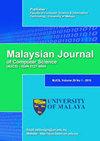基于增量学习和分类器链的流流量粒度网络分类
IF 1.2
4区 计算机科学
Q4 COMPUTER SCIENCE, ARTIFICIAL INTELLIGENCE
引用次数: 0
摘要
在现代网络中,网络可见性对网络运营商来说至关重要。因此,细粒度网络流量分类由于其提供高网络可见性的能力而迅速成为一项重要技术。细粒度的网络流量分类将流量分类为详细的类,如应用程序名称和服务。应用程序名称代表父应用程序,如Facebook,而应用程序服务是父应用程序中的单个操作,如Facebook评论。大多数关于细粒度分类的研究都集中在应用程序名称级别的分类上。除此之外,现有研究中的评估也很有限,仅使用静态和不可变的数据集,不足以反映现实世界流量的连续性和演变性。因此,本文旨在介绍一种基于流媒体流量的粒度分类技术。所提出的技术实现了使用分类器链连接在一起的两个自适应随机森林分类器,以同时产生两个粒度级别的分类。在使用Apache Kafka的流式测试台设置上的性能评估表明,所提出的技术在应用程序名称级别和应用程序服务级别分别获得了99%和88%的平均F1分数。此外,ISCX VPN非VPN公共数据集上的性能基准也保持了可比较的结果,此外记录的分类时间低至每个数据包2.6毫秒。结果表明,所提出的技术证明了其在流媒体流量中进行细粒度分类的优势和可行性。本文章由计算机程序翻译,如有差异,请以英文原文为准。
GRANULAR NETWORK TRAFFIC CLASSIFICATION FOR STREAMING TRAFFIC USING INCREMENTAL LEARNING AND CLASSIFIER CHAIN
In modern networks, network visibility is of utmost importance to network operators. Accordingly, granular network traffic classification quickly rises as an essential technology due to its ability to provide high network visibility. Granular network traffic classification categorizes traffic into detailed classes like application names and services. Application names represent parent applications, such as Facebook, while application services are the individual actions within the parent application, such as Facebook-comment. Most studies on granular classification focus on classification at the application name level. Besides that, evaluations in existing studies are also limited and utilize only static and immutable datasets, which are insufficient to reflect the continuous and evolving nature of real-world traffic. Therefore, this paper aims to introduce a granular classification technique, which is evaluated on streaming traffic. The proposed technique implements two Adaptive Random Forest classifiers linked together using a classifier chain to simultaneously produce classification at two granularity levels. Performance evaluation on a streaming testbed setup using Apache Kafka showed that the proposed technique achieved an average F1 score of 99% at the application name level and 88% at the application service level. Additionally, the performance benchmark on ISCX VPN non-VPN public dataset also maintained comparable results, besides recording classification time as low as 2.6 ms per packet. The results conclude that the proposed technique proves its advantage and feasibility for a granular classification in streaming traffic.
求助全文
通过发布文献求助,成功后即可免费获取论文全文。
去求助
来源期刊

Malaysian Journal of Computer Science
COMPUTER SCIENCE, ARTIFICIAL INTELLIGENCE-COMPUTER SCIENCE, THEORY & METHODS
CiteScore
2.20
自引率
33.30%
发文量
35
审稿时长
7.5 months
期刊介绍:
The Malaysian Journal of Computer Science (ISSN 0127-9084) is published four times a year in January, April, July and October by the Faculty of Computer Science and Information Technology, University of Malaya, since 1985. Over the years, the journal has gained popularity and the number of paper submissions has increased steadily. The rigorous reviews from the referees have helped in ensuring that the high standard of the journal is maintained. The objectives are to promote exchange of information and knowledge in research work, new inventions/developments of Computer Science and on the use of Information Technology towards the structuring of an information-rich society and to assist the academic staff from local and foreign universities, business and industrial sectors, government departments and academic institutions on publishing research results and studies in Computer Science and Information Technology through a scholarly publication. The journal is being indexed and abstracted by Clarivate Analytics'' Web of Science and Elsevier''s Scopus
 求助内容:
求助内容: 应助结果提醒方式:
应助结果提醒方式:


